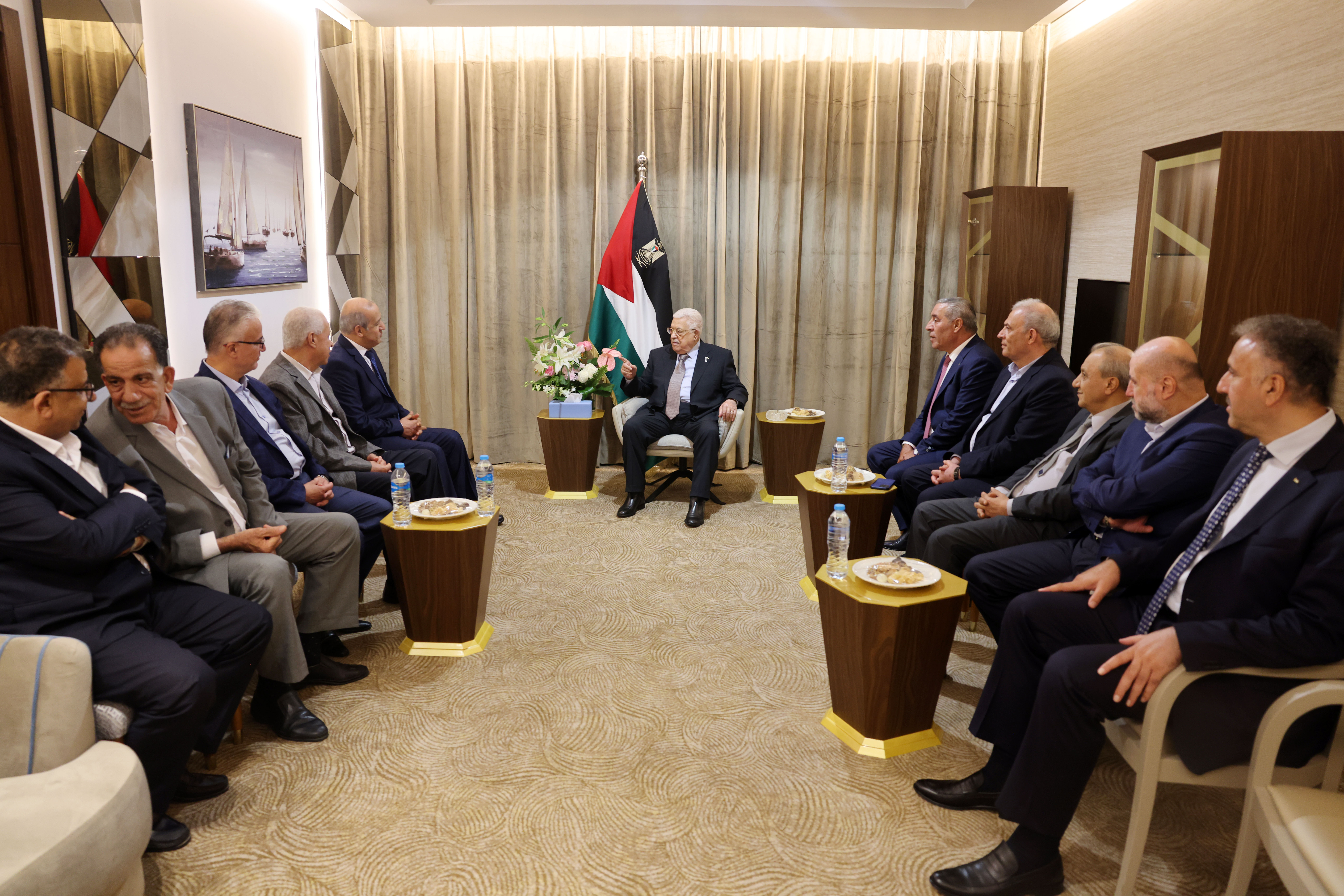Cairo, Egypt– Rival Palestinian political leaders meeting in Egypt decided on Sunday to form a committee on intra-Palestinian reconciliation, a move that one analyst doubted would end their 17-year rift.
President Mahmud Abbas and Hamas leader Ismail Haniyeh met for rare face-to-face talks in the coastal city of El Alamein along with representatives of most Palestinian political factions.
The latest attempt at reconciliation aims to bridge the gap between the parallel governments of Hamas in the blockaded Gaza Strip and of the Palestinian Authority — controlled by Abbas’s secularist Fatah movement — which administers Palestinian-run areas of the occupied West Bank.
Abbas and Haniyeh were joined by the heads of other factions, except for the powerful Islamic Jihad and two other minor groups.
Islamic Jihad had made the release of prisoners held by PA security forces a condition for sending representatives to El Alamein.
Haniyeh earlier Sunday called on Abbas to end “security collaboration” with Israel and “political arrests”, according to participants at the meeting.
The Hamas leader also said “a new, inclusive parliament must be formed on the basis of free democratic elections”.
Hamas, which won the Palestinians’ last legislative polls held in 2006, has repeatedly called for general elections.
Abbas said Sunday “the coup d’etat and the division that befell us after… must end,” referring to clashes between Hamas and Fatah that followed the 2006 vote.
“We must return to a single state, a single system, a single law and a single legitimate army,” Abbas added.
‘Kill’ unity
To work towards this, the 87-year-old president announced “the formation of a committee to continue the dialogue… end divisions and achieve Palestinian national unity”.
A later statement from Abbas said he “hopes for an upcoming meeting soon in Egypt to announce to our people the end” of the 17-year split “and the return to Palestinian national unity”.
Palestinian political scientist Moukhaimer Abu Saada told AFP that the formation of the committee was no cause for celebration.
“The best way to kill something is to form a committee for it,” he said, speaking from Gaza.
He said he doubted the move would produce any progress towards “ending the division or setting a date for Palestinian elections”.
Echoing a sense of despair among Palestinians, one Facebook user wrote that the talks in El Alamein — which means “two flags” in Arabic — showed the impassable distance between Hamas and Fatah who “fly completely different flags”.
On Sunday, Haniyeh called for “the restructuring of the Palestine Liberation Organization”, the umbrella institution promoting Palestinian statehood. The PLO includes most Palestinian political factions, but not Hamas or Islamic Jihad.
The PLO is “the sole legitimate representative of the Palestinian people”, Abbas said.
He called for “peaceful popular resistance”, while Haniyeh touted “comprehensive resistance”.
Uptick in violence
Khaled al-Batsh, an Islamic Jihad leader, said the group had “hoped for a response from Mahmud Abbas to grievances and calls for the release” of its members detained in the West Bank.
“We have been surprised by an unprecedented security incursion against resistance fighters,” he said.
Sunday’s meeting came amid a resurgence of violence in the Israeli-Palestinian conflict, particularly in the West Bank which Israel has occupied since the 1967.
Violence linked to the conflict this year has killed at least 203 Palestinians, 27 Israelis, one Ukrainian and one Italian, according to an AFP tally compiled from official sources from both sides.
The spike has coincided with the tenure of Israeli Prime Minister Benjamin Netanyahu’s hard-right administration, which took office late last year and includes members with a history of anti-Palestinian rhetoric.
In the Gaza Strip on Sunday, hundreds of people demonstrated to demand an “end to division”, said AFP correspondents in the coastal enclave.
In Lebanon’s largest refugee camp for Palestinians, Ain al-Helweh in the southern port city of Sidon, fighting overnight and on Sunday killed five Fatah members and an Islamist fighter.
Lebanese Prime Minister Najib Mikati called the fighting “suspicious in the current regional and international context”, but Palestinian representatives in El Alamein did not comment on the clashes.

